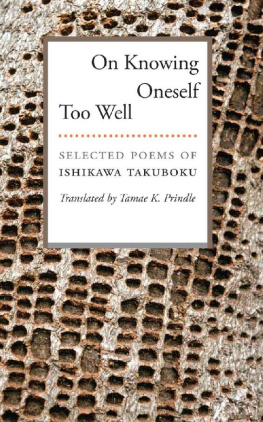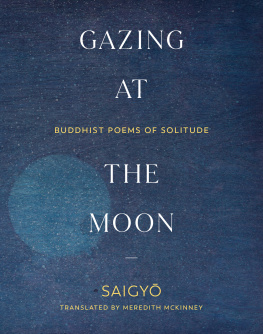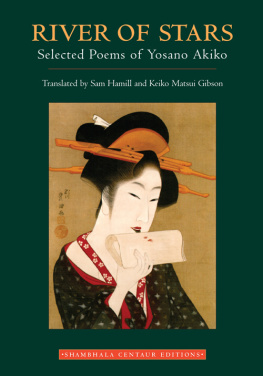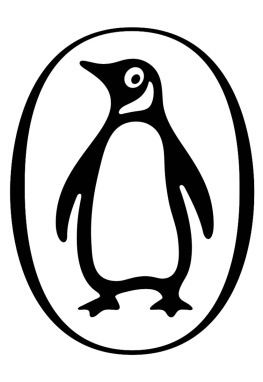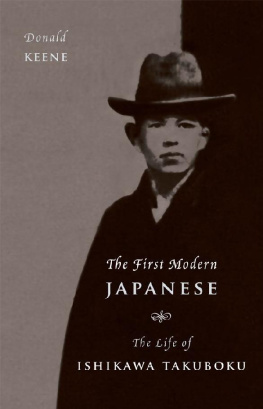On Knowing OneselfTooWell
On Knowing Oneself Too Well Selected Poems of Ishikawa Tokuboku Translated by Tamae K. Prindle syllabic press 2010 2010 Syllabic Press All rights reserved. Published 2010 Printed in the United States of America ISBN 978-0-615-34562-8 Syllabic Press 200 E. Joppa Road, Suite l-101 Towson, MD 21286 syllabicpress@gmail.com Publication of this book was supported by a grant from the Maryland State Arts Council. Library of Congress Card No. 2010900062 Contents
Acknowledgments vii
Introduction ix
Let us sing
An Aeroplane 3
To a Crab 4
a love song to myself
I Will Go Alone 25
To My Sister 26
A White Face 29
SMOKE (1)
A Feeble Thought 38
SMOKE (2)
You, Flower 47
in response to a pleasant autumn
wind
The Illusion of Cherry Blossoms 51
A Crossroad 53
The Moon and the Gong 55
To a Takuboku Bird 56
August 57
A Willow Leaf 58
After an Endless Discussion 59
An Epitaph 60
A Fist 62
Dont Wake Up 63
unforgettable people (1)
An Old Man 77
unforgettable people (2)
when i take my gloves off
No Title (1) 97
SAD TOYS
No Title (2) 124
In a Wagon 126
An Afternoon in My Study 127
Home 128
vi
Acknowledgments I am grateful to Professor John Ehrstine at the Washington State University (WSU) English Department who suggested that I translate Japanese poems into English.
I am also deeply indebted to Professor Hack Chin Kim at WSU who closely supervised my translation. Robert Schreur kindly brought the book to publication for Syllabic Press. The poems translated in this volume come principally from the two-volume collection Ishikawa Takuboku-sh, edited by Tsunatake Furuya (Shinch Bunko, 1950). T.K.P.
vii
viii
Introduction I shikawa Takuboku was born into a well-educated Buddhist monks family on October 27, 1885 in Hinoto Village in northern Japan. (His birthdate was officially recorded as February 20, 1886 in the village census, causing discrepancies about his age at the time of his death.) The third of four children, but the only son, his given name was Hajime, meaning first one.
According to a sisters memoir, he was very much his mother and fathers favorite. He distinguished himself at school and took an early interest in literature. At sixteen he was caught cheating on a mathematics exam and left school, living briefly in Tokyo. He soon gained recognition from important literary figures of the day for his essays, fiction, and poetry, written in both traditional forms and the longer shintaishi (new-style) form, influenced by Western verse. At eighteen he was given the pen-name Takuboku, meaning woodpecker, by the poet Yasano Tekkan. At nineteen he married his childhood sweetheart, Setsu Hariai.
At this time his father was discharged from his position as temple priest, and Takuboku became responsible for supporting his family, which expanded with the birth of his daughter, Kyoko, when he was twenty-one. He found work as a substitute teacher but was fired after organizing a student strike against the school principal. His family was forced to live apart his mother returned to their hometown, his wife and daughter went to live with his wifes family, and Takuboku moved to the far northern city of Hakodate to work as an editor, until he was forced to leave after a major portion of the city was destroyed in a fire. He then found work in various cities as a proof-reader, reporter, and editor. Occasionally able to reunite his family, he was frequently forced by poverty to separate again, often surviving solely on small loans and gifts from friends. He became deeply interested in socialism and was remarkably prolific, writing nine novels and nearly a thousand poems in one year, sometimes composing fifty or more poems in a single night.
At age twenty-two he fell in love with a geisha, Koyakko, whom he names in several poems. At twenty-four his son, Shinichi, was born, dying twenty-three days later. A month afterward his first volume of tanka poems, A Handful of Sand, was published. Takuboku spent the advance he received for the book to pay for his sons funeral. In this volume (consisting of the seven tanka-sequences in the present collection, exclusive of sad toys), Takuboku followed the innovative practice of his contemporary Toki Aiki in presenting tanka (traditionally five units of 5, 7, 5, 7, and 7 syllables) in three lines of variable length. In their subject-matter, diction, and purpose, the poems brought a frank immediacy and striking modernity to this twelve-century-old poetic form.
Soon after the books publication, Takuboku was diagnosedwith tuberculosis and began a series of hospitalizations, endingin his death on April 12, 1912 at age twenty-six. His motherhad died a month previously of tuberculosis, and a year later his wife died of the disease. Takubokus second volume of tanka, Sad Toys, was published posthumously two months after his death.
ix
On Knowing OneselfTooWell
Let us sing
Let us sing
When, worn-out by incessant battle, joints of our limbs ache,
When a deep woe visits us,
When our child suffers in deathbed,
When we see a beggar who resembles our mother,
When we have exhausted our soul in love
Let us sing at those moments,
Gazing into a silent sky,
O my starved comrades.
An Aeroplane
Look, today again,
At the aeroplane high in the blue sky.
A page boy
On one of his few Sundays off
In a house alone with his consumptive mother,
The fatigue of his eyes from the busy solitary study of a self-
tutorial text-book...
Look, today again,
At the aeroplane high in the blue sky.
To a Crab You, clever crab on this eastern seashore, Hiding in a hole at high tide, Emerging from it at low tide, Always walking sideways Do you know or dont you know That a tired child saunters by, Swept by a fatal tide, Led by a shimmering light smaller than your eyes? A Love Song to Myself On the white sand of an eastern islet, Wet with tears, I play with a crab.
My memory lingers on the person
Who showed me a handful of sand,
His cheeks wet with tears.
I left my home To cry for several days Facing the ocean.
It is a sad habit
To linger in bed in the morning,
But scold me not, my mother.
I spit on a hunk of soil And form my mothers crying face Oh, how dreary!
I sit in a murky room;
Father and Mother with canes
Emerge from within the wall.
Carrying my mother on my back in jest I failed to walk as many as three steps, Weeping over her being so light.
Though my friends laugh at my habit
Of wandering out of the house
And wandering into the house...
Like my father in our village, I cough also The fear of consumption!
I slept, exhausted,
Feeling my soul
Being sucked into a dark hole.
Were there a pleasant job for me to try I would complete it Before I died.
I curl myself up
In a corner of a crowded train
Night after night I grow more endearing to myself!
The lonely feeling Of slipping out of Asakuras evening crowd After being part of it.
I cut the ear off my pet-dog
Damn!
Is this what I do when Im tired?
A large shopping district in Tokyo.
I cut the ear off my pet-dog
Damn!
Is this what I do when Im tired?
A large shopping district in Tokyo.
In front of a mirror, I try all sorts of facial expressions When I am tired of crying.
Tears, tears,

